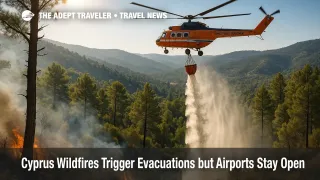Cyprus Wildfires Trigger Evacuations but Airports Stay Open

Scorching temperatures peaking at 44 °C (111 °F) have fanned multiple wildfires across southern Cyprus, killing two people, destroying homes, and forcing evacuations near Limassol and Paphos. Despite the smoke plumes and road closures, Larnaca International Airport (LCA) and Paphos International Airport (PFO) remain operational, with only minor delays reported. Authorities have mobilised more than a dozen aircraft and hundreds of firefighters, while Spain, Jordan, and the United Kingdom rush in aerial support. Travellers face heightened heat-stress risks and should monitor local alerts, but most holiday itineraries can proceed with added flexibility.
Key Points
- Why it matters: Southern resort zones face fast-moving flames at the height of peak season, testing contingency plans
- Two deaths confirmed after residents were trapped in a car north of Limassol
- Four villages near Limassol and Agia Varvara outside Paphos evacuated as winds shift
- Temperatures hit 44 °C, prompting an amber heat warning island-wide
- Paphos and Larnaca airports open; some arrivals delayed, no mass cancellations
- EU Civil Protection Mechanism activated, with water-bombers arriving from Spain and Jordan
Snapshot
Cyprus entered an intense Mediterranean heatwave on July 23, with inland thermometers topping 43 °C and forecast figures climbing higher. By early afternoon, a blaze erupted in pine-covered hills north of wine-country Souni, Limassol District. Fueled by gusts over 25 mph, the fire jumped ravines, rapidly threatening at least four villages and cutting power lines. Parallel ignition points later flared near Paphos, forcing civil-defence teams to order a precautionary evacuation of Agia Varvara. International assistance is en route, but officials warn that shifting winds could drive fresh fire fronts through the weekend.
Background
Wildfires are not unusual in Cyprus' long, dry summers, yet the scale of this week's disaster is the island's worst since 1974. Two decades of warming trends have extended the arid season, dried coniferous stands, and left reservoirs such as Kouris at just 15 percent capacity. The Forestry Department's fuel-moisture index fell below 10 percent, classifying vast tracts as "extreme risk." National meteorologists attribute the current heat dome to a stagnant subtropical ridge that has also scorched Greece and southern Turkey. Tour operators note that most beachfront resorts sit outside fire zones, but inland day-trips, hiking, and wine-route tours now face closures.
Latest Developments
Limassol Front Remains Out of Control
Flames stretching nearly six miles encircle hillside communities from Alassa to Paramytha. Helicopters drawn from Cypriot forces and British Sovereign Base Areas are water-bombing vineyards to shield fuel breaks, yet rugged terrain hampers fire-engine access. President Nikos Christodoulides confirmed the EU has dispatched two Canadair CL-415s from Spain under the rescEU pool, while Jordanian Hueys staged at Larnaca began sorties before dawn. Two victims discovered in a burned-out vehicle raise new concerns over evacuation timing, and at least ten people are hospitalised with smoke inhalation. Officials pledge a preliminary damage survey once hot-spots cool.
Paphos Blaze Spurs Agia Varvara Evacuation
A separate fire ignited at 4 p.m. near Agia Varvara, five miles northeast of Paphos town. Five engines and two Air Tractor planes contained its southern flank by nightfall, but erratic gusts briefly closed the B7 trunk road. Civil Defence teams escorted roughly 120 residents to temporary shelters in Chloraka and Kissonerga. No injuries were reported, and the fire's perimeter shrank after humidity rose overnight. Still, authorities warn that wind shifts could reignite smouldering stands, urging travellers to avoid rural byways and follow police diversions toward coastal routes.
Heatwave Sets New Records and Strains Resources
The Meteorological Service expects inland highs of 44 °C through Monday, pushing the Wet Bulb Globe Temperature near dangerous thresholds. Municipalities opened air-conditioned "Heatwave Assistance Centres" from 9 a.m. to 6 p.m., offering cold drinks and medical staff. Power grid operator EAC instituted voluntary consumption cuts to prevent overloads. Health officials advise tourists to schedule outdoor activities before 10 a.m., carry at least one litre of water per hour, and wear UV-rated clothing.
Analysis
The twin emergencies of wildfire and extreme heat underscore Cyprus' climate-vulnerability as a Mediterranean holiday hub. While authorities efficiently activated cross-border firefighting protocols, years of under-funded forest-thinning and declining reservoir levels compounded ignition risks. From a traveller's standpoint, the episode highlights the need for flexible itineraries, comprehensive insurance covering natural-hazard disruptions, and real-time alert subscriptions such as the Department of Forests SMS system. Airlines continue to route through Larnaca and Paphos, yet runway operations may slow during peak afternoon heat, when asphalt temperatures exceed safe tyre limits. Tour operators should proactively rebook inland excursions, pivoting to coastal or maritime alternatives less exposed to fire danger and heat-stress. Long-term, Cyprus' tourism sector must balance growth with resilience-investing in early-warning drones, buffer-zone maintenance, and heat-adapted visitor infrastructure-to safeguard the island's US$3.2 billion annual travel economy.
Final Thoughts
Travellers bound for Cyprus this week can still land, but they should stay nimble, hydrate aggressively, and heed local advisories as firefighters battle historic flames. If plans include mountain villages or wine-route drives, consider postponement until containment is declared. With airports open and coastal resorts largely unaffected, holidays remain possible-provided flexibility, vigilance, and respect for local emergency measures guide every step amid the ongoing Cyprus wildfires.
Sources
- Two dead, homes burn in massive wildfire in Cyprus
- Firefighters in Cyprus battle huge wildfires that forced evacuation of four villages
- Cyprus travel advice - GOV.UK
- Firefighters struggle to contain wildfires as heatwave sears Turkey and Cyprus
- Is it safe to travel to Cyprus? Latest advice after wildfire leads to evacuations
